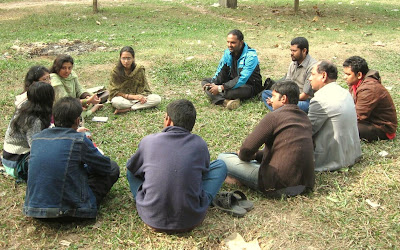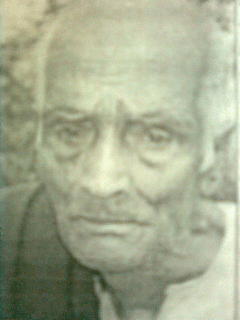Interview Of a Dedicate Upcoming Artist TARAK MAHADI

Born in Mymensingh, Mymensingh a District of Bangladesh in division of Dhaka, on December 15, 1984.
I had finished my School, College at Mymensingh & recently(2009) i had finished BFA(hons) from fine art faculty (University of Dhaka).
I think a artist, anywhere in the world, must do their work in Art.
Art is the voice of our society or it can be the reflection of our society.
An artist is like a mirror, a mirror of their own culture, is the most important
thing in the world.
I was born in Bangladesh. We are exceptional excellences of our people and all over the world,
Because, its known to u we fought for our freedom in 1971. Not only that, we also fight for our language in 1952 and so the February 21 is celebrated On the day of the International Mother Tongue In this sense, we are the richest and the proud citizens of the world.
MY ARTWORK:
To work, at first I need a concept and put it on paper and then finally I give to shape it in my thoughts. That would be my sculpture, painting or Installation.
The art connects me to life, reality and thought I am identified with the different
Characters in my country, with people working in the field and look at the life expectancy,
Women who care and educated their children, with love, religious tradition, which positively or negatively affects the lives of many people.
In relation to my sculptures, I take forms of reality, and I interpret and model them
in a particular way, through the interplay of volumes and spaces.
They can be small busts, representing the head and upper chest, a torso,
if they lack the head, legs or arms. I mainly use the technique of modeling
and polished, adding or removing portions of material.
I seek to merge the form, time and space, creating shapes, modeling, giving strength and dynamism to the volume, taking care of the contour and finish
of the image with different textures.
My art is also my spiritual journey and my love for the material that I use,
I take care of clay because it is an old and noble material and it lets me express the great love I feel for my work.
GROUP EXHIBITS:
Exhibited at the Fularton Museum Gallery of WAF in California USA. July 2009
Exhibited at the World Art Expo in California USA. in the city of Brea. June 2009
*Raku Workshop Outcome Show 2009, Zainul Gallery, Faculty of Fine Art, University of Dhaka.
*Water Color Exhibition, Arrange by National Kite federation, Zainul Gallery, Faculty of Fine Arts, Dhaka University, Bangladesh. 2009.
*Friendship Art exhibition, Chobir Hat at Drik Gallery, Bangladesh, 2008.
*Five Young Artists Ceramic Art Exhibition, Zainul Gallery, Faculty of Fine Arts,
Dhaka University,Bangladesh.2008.
*Reconstruction Art on RACU, Zainul Gallery, Faculty of fine arts, Dhaka University,Bangladesh,2008.
*16th Young Art exhibition, Bangladesh Shilpokola Academy,2008.
*Shilpacharjo Zainul Abedin art Exhibition at Mymensingh art museum Gallery, Bangladesh, 2008.
*Annual Art Exhibition, Faculty of fine art, Dhaka University 2003, 2004, 2005, 2008, Bangladesh.
*Berger Young Art Exhibition,2004, 2005, Zainul Art gallery, Dhaka, Bangladesh.
*Ziaur Rahman Art Exhibition, Zainul Art Gallery, Dhaka, Bangladesh, 2003.
*Annual art Exhibition, Zainul Abedin Art Museum, Mymensingh, Bangladesh, 1998.
Workshop:
*Title Water Color Workshop.
Venue - Faculty of Fine Arts, Zainul Gallery, Dhaka, Bangladesh.
Organized & Supported by-National Kite Federation, Bangladesh.
Year 2009
*Title- IDEA SPRINGBOARD
Workshop on art beyond canvas
Venue- Office of jolrong.com
Organizer - www.jolrong.com
conductor-Moyeenul Alam
Year-2009
*Title - Conceptual Raku Workshop at Ceramic inaugural Bangladesh.
Venue - Faculty of fine arts and Ceramic Department of Bangladesh.
Year - 2007
Supervisor- Mahbubur Rahman artist
Residence Program
*Title - RACU Project Reconstruction
Venue - Britto Art Trust, Hatirpul, Dhaka. and Poraparaspace, Potanga, Chitagong.
rganised by- Britto Art Trust.
Supported by- FORD FOUNDATION
Year - 2008
Workshop Given
*Title - RAKU Workshop (join venture with Sculpture Department, Faculty of Fine Art)
Organised by- Britto Art Trust.
Year 2009.
Award:
*1st place on send sculpture competition 2009, at Cox's bazar.
Organized by National Kite Federation
* 'Bhrammaputro' designation gotten for Ceramic Sculpture, at Zainul Abedin Art Exhibition(mymensingh) 2008
*'Birsrestho Mohiuddin Jahangir Memorial Award' on oil Portrait Painting at Ziaur Rahman Exhibition. 2003
Information Collected By: Sejuti Saha









































